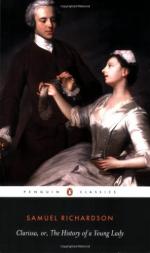Capt. Ay, talk of spirit, there’s a spirit, now you have named Miss Howe! [And so I led him to confirm all I had said of that vixen.] Yet she was to be pitied too; looking with meaning at me.
As I have already hinted, I had before agreed with him to impute secret love occasionally to Miss Howe, as the best means to invalidate all that might come from her in my disfavour.
Capt. Mr. Lovelace, but that I know your modesty, or you could give a reason—
Lovel. Looking down, and very modest—I can’t think so, Captain—but let us call another cause.
Every woman present could look me in the face, so bashful was I.
Capt. Well, but as to our present situation—only it mayn’t be proper— looking upon me, and round upon the women.
Lovel. O Captain, you may say any thing before this company—only, Andrew, [to my new servant, who attended us at table,] do you withdraw: this good girl [looking at the maid-servant] will help us to all we want.
Away went Andrew: he wanted not his cue; and the maid seemed pleased at my honour’s preference of her.
Capt. As to our present situation, I say, Mr. Lovelace—why, Sir, we shall be all untwisted, let me tell you, if my friend Mr. John Harlowe were to know what that is. He would as much question the truth of your being married, as the rest of the family do.
Here the women perked up their ears; and were all silent attention.
Capt. I asked you before for particulars, Mr. Lovelace; but you declined giving them.—Indeed it may not be proper for me to be acquainted with them.—But I must own, that it is past my comprehension, that a wife can resent any thing a husband can do (that is not a breach of the peace) so far as to think herself justified for eloping from him.
Lovel. Captain Tomlinson:—Sir—I do assure you, that I shall be offended—I shall be extremely concerned—if I hear that word eloping mentioned again—
Capt. Your nicety and your love, Sir, may make you take offence—but it is my way to call every thing by its proper name, let who will be offended—
Thou canst not imagine, Belford, how brave and how independent the rascal looked.
Capt. When, young gentleman, you shall think proper to give us particulars, we will find a word for this rash act in so admirable a lady, that shall please you better.—You see, Sir, that being the representative of my dear friend Mr. John Harlowe, I speak as freely as I suppose he would do, if present. But you blush, Sir—I beg your pardon, Mr. Lovelace: it becomes not a modest man to pry into those secrets, which a modest man cannot reveal.
I did not blush, Jack; but denied not the compliment, and looked down: the women seemed delighted with my modesty: but the widow Bevis was more inclined to laugh at me than praise me for it.
Capt. Whatever be the cause of this step, (I will not again, Sir, call it elopement, since that harsh word wounds your tenderness,) I cannot but express my surprise upon it, when I recollect the affectionate behaviour, to which I was witness between you, when I attended you last. Over-love, Sir, I think you once mention—but over-love [smiling] give me leave to say, Sir, it is an odd cause of quarrel—few ladies—




